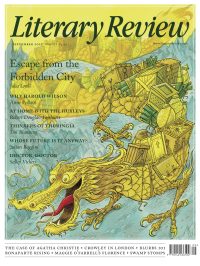Robert Colls
Brum’s the Word
Second City: Birmingham and the Forging of Modern Britain
By Richard Vinen
Allen Lane 592pp £25
It takes about fifty minutes to travel by train from Leicester, where I live, to Birmingham. It’s a flat ride and we slide into New Street station having seen nothing but fields and sheds. No big natural features. No stand-out architecture. No monumental structures, unless we are talking Spaghetti Junction, and we aren’t because that’s only monumental from the air. The city has nice bits by the canal and Symphony Hall; it has the National Exhibition Centre and even the new Bull Ring, home of the world’s biggest Primark. But on the face of it, Birmingham is just another conurbation too big to go through and too wide to go around.
At the time of Domesday Book, Birmingham consisted of nine households. By the Tudor period, it had grown off the back of the trade in wool and leather, its wealth shown in the foundation of King Edward VI’s grammar school in 1552. By the time William Hutton wrote its first history in 1781, it had a population of around seventy thousand and had become known for the manufacture of metal items – all of them useful, from belt buckles to saucepans. A canal linking Birmingham to Staffordshire opened in 1772 and helped make coal cheap, and when Matthew Boulton and James Watt’s Soho Foundry put that coal to work, it set Birmingham squarely on the map for steam engines and everything else carboniferous. Birmingham elected its first MP in 1832, became a municipal borough in 1838 and was awarded city status in 1889, by which time it had all the hallmarks of English industrial civilisation, including a town hall in the classical style and a lot of smoke and graft.
Birmingham had once hosted a distinguished scientific business elite, who came together in the Lunar Society (1765–1813), but the world had to wait for the Chamberlains, manufacturers of three quarters of the world’s screws, before it could see what the place really stood for. As mayor of Birmingham

Sign Up to our newsletter
Receive free articles, highlights from the archive, news, details of prizes, and much more.@Lit_Review
Follow Literary Review on Twitter
Twitter Feed
Alfred, Lord Tennyson is practically a byword for old-fashioned Victorian grandeur, rarely pictured without a cravat and a serious beard.
Seamus Perry tries to picture him as a younger man.
Seamus Perry - Before the Beard
Seamus Perry: Before the Beard - The Boundless Deep: Young Tennyson, Science, and the Crisis of Belief by Richard Holmes
literaryreview.co.uk
Novelist Muriel Spark had a tongue that could produce both sugar and poison. It’s no surprise, then, that her letters make for a brilliant read.
@claire_harman considers some of the most entertaining.
Claire Harman - Fighting Words
Claire Harman: Fighting Words - The Letters of Muriel Spark, Volume 1: 1944-1963 by Dan Gunn
literaryreview.co.uk
Of all the articles I’ve published in recent years, this is *by far* my favourite.
✍️ On childhood, memory, and the sea - for @Lit_Review :
https://literaryreview.co.uk/flotsam-and-jetsam